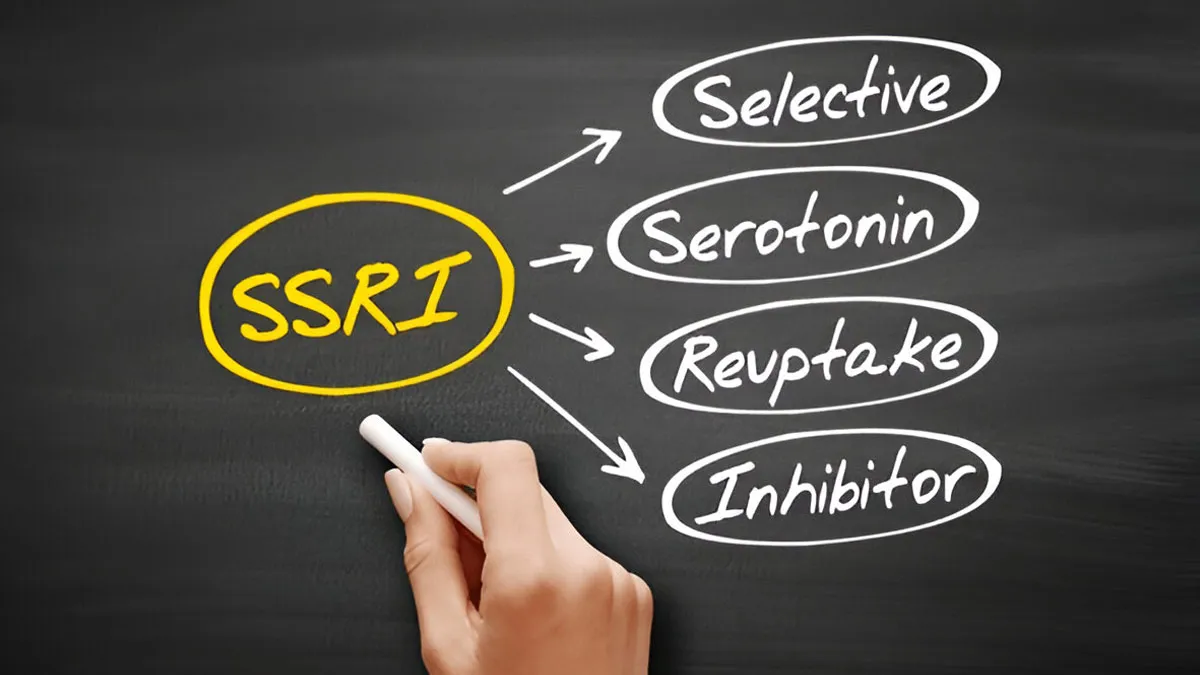
Mental health is no longer a hush-hush topic. More and more people are opening up about their mental health struggles, whether it's depression, anxiety, panic attacks, or obsessive thoughts. And as awareness grows, so does the number of people seeking help. For many of them, one common form of treatment includes medications known as SSRIs. But what are SSRIs, and how do they work?
Table of Content:-
CHECK YOUR
MENTAL HEALTH

We spoke to Dr Kersi Chavda, Consultant Psychiatrist, PD Hinduja Hospital and MRC, Khar, Mumbai, who explained SSRIs, their uses, and importance.
What are SSRIs?

SSRI stands for Selective Serotonin Reuptake Inhibitors. It might sound like a mouthful, but the concept is straightforward once you break it down. These medicines help increase the levels of a chemical called serotonin in your brain.
Serotonin is often called the 'feel-good' chemical. It affects everything from your mood and sleep to your appetite and stress response. When your brain has too little serotonin, it can result in emotional and physical symptoms, like feeling persistently sad, anxious, tired, or numb. This is where SSRIs come in; they help regulate serotonin levels, making you feel more emotionally balanced.
Dr Chavda said, “SSRIs help people manage the symptoms of mood disorders by gradually restoring the chemical balance in the brain. They are among the most commonly prescribed medications in psychiatry because they are generally well tolerated and effective.”
Also Read: Mental Health Matters: Why Substance Abuse Is A Symptom Of A Deeper Crisis
Common SSRIs You Might Hear Of
There are several SSRIs available, and the doctor’s choice depends on your specific symptoms, overall health, and how your body responds to them. Some commonly prescribed ones include:
- Fluoxetine
- Sertraline
- Escitalopram
- Paroxetine
All of them work similarly, but the exact formulation and possible side effects can vary slightly from one person to another.
What to Expect When You Start

One of the most important things to understand is that SSRIs are not quick fixes. They don’t start working immediately like a painkiller would. Most people begin to notice changes after 2-4 weeks, and in some cases, it can take up to six weeks to feel the full effect.
Dr Chavda explains, “It’s common to experience mild side effects in the first few days, such as nausea, dizziness, sleep changes, or even a little more anxiety. These effects usually subside as the body adjusts to the medication.
During this adjustment phase, it's crucial to:
- Keep a consistent schedule for taking your medication every day.
- Avoid skipping doses.
- Never stop taking them suddenly without talking to your doctor.
Stopping SSRIs abruptly can lead to withdrawal symptoms like headaches, mood swings, and sleep disturbances. If you ever feel like stopping, your doctor will guide you through a safe and gradual tapering process.
Also, while rare, some individuals may feel increased anxiety or restlessness in the first few days. If you or someone you know begins to feel unusually low or experiences disturbing thoughts, including thoughts of self-harm, contact your doctor immediately.
How Long Do You Need to Take Them?

There’s no one-size-fits-all answer. Some people take SSRIs for a few months, others for a few years. It depends on the severity of your condition, how well you respond to treatment, and whether you’ve experienced repeated episodes.
"Think of SSRIs the way you’d think of wearing spectacles. You don’t wear them forever, but you keep them on as long as your vision needs correction. Similarly, SSRIs support your mental clarity and emotional well-being for as long as needed," said Dr Chavda.
Also Read: Mental Health Matters: Key Signs You’ve Healed And When It’s Time To Stop Therapy
Is It Okay to Take Medication for Mental Health?
Absolutely, and this cannot be said enough. Taking an SSRI is not a sign of weakness, failure, or something to be ashamed of. If your brain is struggling with a chemical imbalance, these medicines help it function better, just like insulin helps someone with diabetes or an inhaler helps someone with asthma.
“Medications like SSRIs can make a significant difference, especially when paired with psychotherapy, lifestyle changes, and a strong support system,” added Dr Chavda.
Bottomline
Dr Chavda concluded, "If you're feeling persistently low, overwhelmed by anxiety, or struggling with panic, you're not alone, and you don’t have to suffer in silence. SSRIs are one of many tools that can help. Therapy, mindful habits, regular sleep, and social support also play a huge role in recovery. Mental health is just as real and important as physical health. With the right help and support, healing is possible, and so is feeling like yourself again.
[Disclaimer: This article contains information provided by an expert and is for informational purposes only. Hence, we advise you to consult your professional if you are dealing with any health issue to avoid complications.]
Also watch this video
How we keep this article up to date:
We work with experts and keep a close eye on the latest in health and wellness. Whenever there is a new research or helpful information, we update our articles with accurate and useful advice.
Current Version